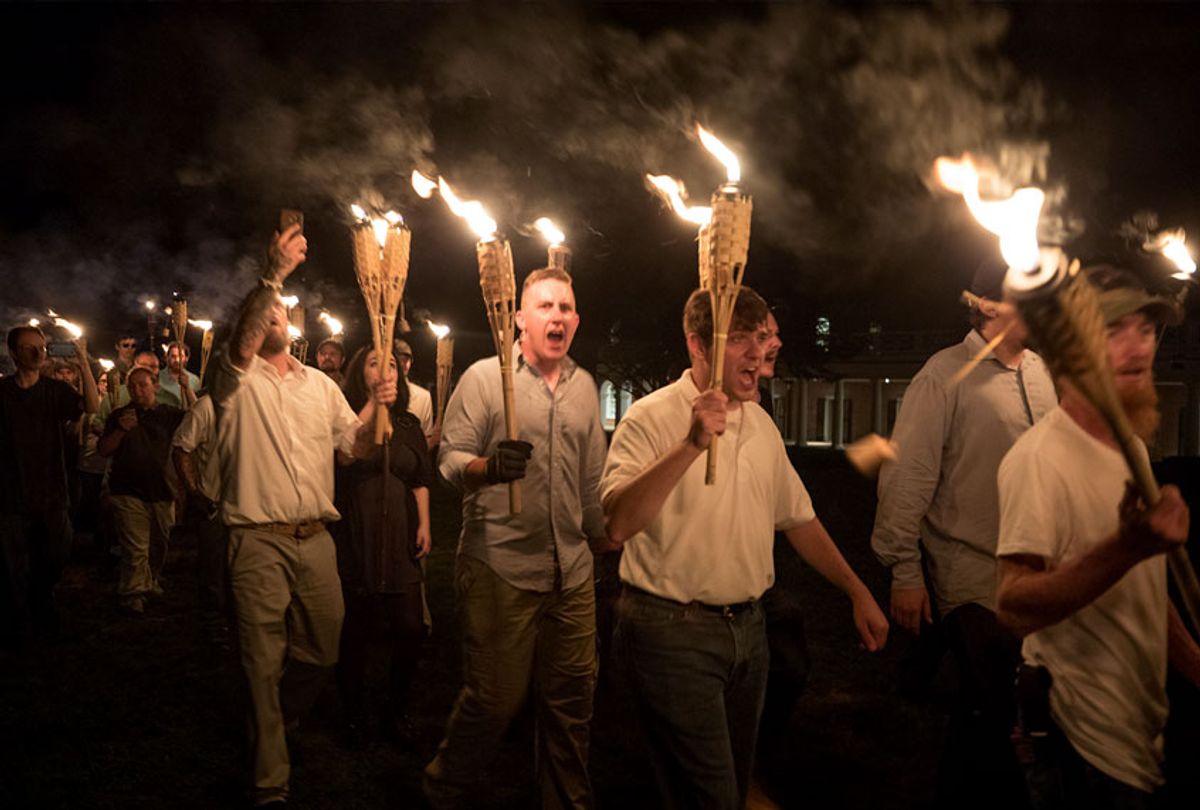It didn't take long for a landmark civil trial over the deadly 2017 "Unite the Right" rally in Charlottesville, Virginia, to take a bizarre turn.
Just hours into proceedings — which are expected to last for months — neo-Nazi Christopher Cantwell dropped racial slurs, made a passing reference to Adolf Hitler's Mein Kampf, floated a conspiracy theory involving Antifa and plugged his own radio show, managing to fit it all in his opening statement, according to BuzzFeed News.
Later, Richard Spencer, a self-identified white nationalist who coined the term "alt-right," was cut off multiple times by a judge, who at one point pleaded with him to "stick to the facts."
The now-infamous rally, which was held Aug. 11-12, 2017, was sparked by the planned removal of a statue of the Confederate general Robert E. Lee. One woman, Heather Heyer, lost her life after a man drove his car into a counter-protest against the white nationalist gathering. Those involved in the incident, as well as a separate beating of another counter-protester, are now facing prison time.
The civil case that began this week, however, is meant to bankrupt Cantwell, as well as several white supremacist organizations. The case was filed under the Ku Klux Klan Act of 1871, which is credited with hobbling the organization just as it began to take root following the Civil War.
Want a daily wrap-up of all the news and commentary Salon has to offer? Subscribe to our morning newsletter, Crash Course.
At the trial a legal team for Integrity First for America, the non-profit civil rights group spearheading the case, played video footage of the rally, including the torch-wielding mob chanting, "Jews will not replace us!" and "Blood and soil!"
Representatives for the organization also spoke about the scars, both physical and mental, that the victims of the violence have carried with them since 2017.
The case hinges on whether or not Cantwell, Spencer and others involved with planning the rally anticipated the violence their event ultimately brought to Charlottesville. Cantwell, who says he is representing himself due to the cost of hiring an attorney, brushed off the idea during his opening statement.
"[The jury will] hear us making a couple racist jokes. We're sort of notorious for those things," Cantwell said. "But what you won't hear is a conspiracy to commit any crime, much less a violent one."
Richard Spencer, who is also representing himself, argued that because he didn't know the other defendants before 2017, there could not have been a conspiracy. He also went on a wild rant about last summer's Black Lives Matter protests, which he said "eventuated in vandalism, looting, violence, and riots."
RELATED: The Charlottesville model: Trump's "fine people" praise of white nationalists is now GOP mainstream
Others also mentioned BLM, floating another false-flag conspiracy that the "Unite the Right" violence in 2017 was really perpetuated by antifascists and BLM activists.
The prosecution's opening statement, meanwhile, addressed a trove of social media posts, private chats, emails and texts that show neo-Nazis and white supremacists "discussing weaponry they would bring to Charlottesville and how they would use them to attack their enemies."
Prosecutor Karen Dunn said, "This case is a case about violence and intimidation that was planned for months and culminated in a tragic and violent weekend on Aug. 11 and 12 of 2017, right here in Charlottesville, Virginia."



Shares